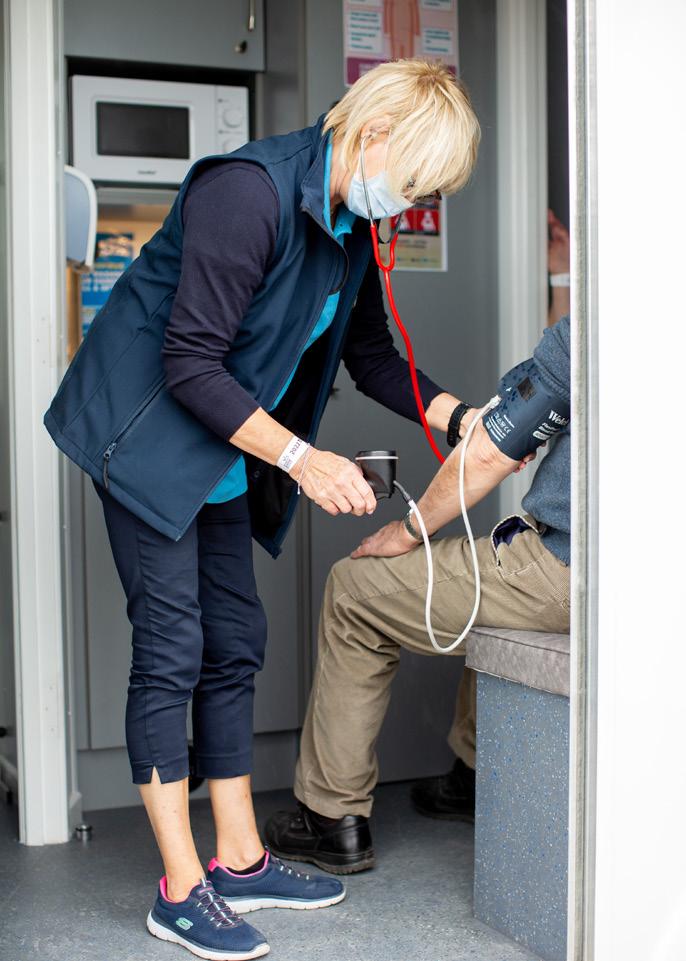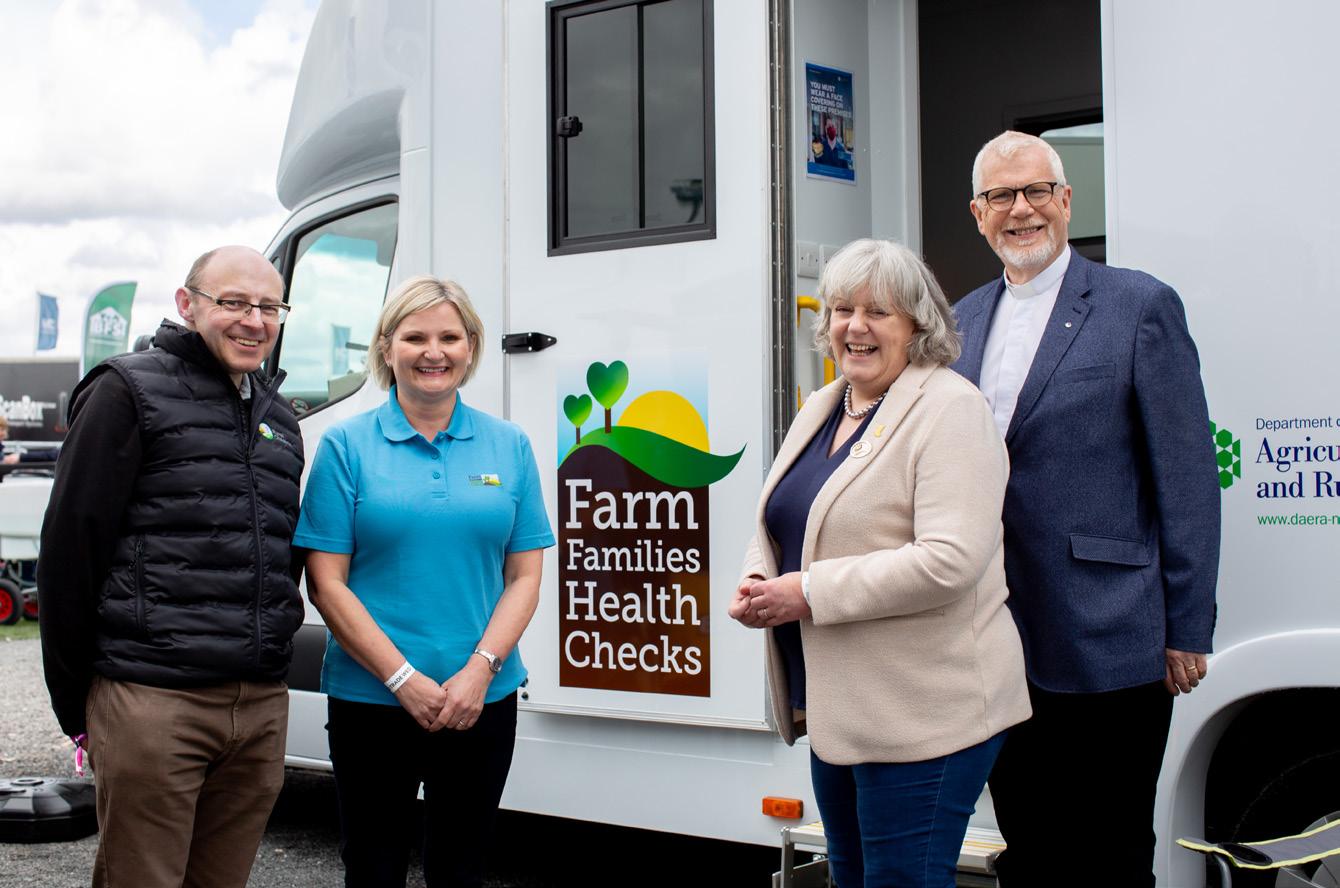
7 minute read
10 years of farm family health checks
10 years of farm family health checks
Rebecca McConnell meets Christina Faulkner, coordinator of the Farm Families Health Checks programme as they celebrate 10 years of bringing medical health checks in a portable clinic to farmers and their families across Northern Ireland.
Growing up on a farm, I was always amazed at my dad being able to give calves medicine to make them better – how he would load up the syringe with so many CC and insert the antibiotic into the animal’s neck. Farmers are part animal doctors, part mechanics, part engineers, amongst many other job titles.
Perhaps it is a sweeping statement to say that farmers will phone a vet about a sick animal quicker than they will phone their own doctor about personal health issues, such is their desire to look after the animals, often to the detriment of their own health.
So having a service that brings the health professionals closer to the farmers in rural areas, especially at a time when the health service is under so much pressure, is surely good news for everyone.
Enter the Farm Families Health Checks programme, which this year is celebrating 10 years on the road. This is a free of charge programme delivered by the Northern Health and Social Care Trust, funded by the Department of Agriculture, Environment and Rural Affairs and the Public Health Agency, with the aim of providing an easily accessible health check programme specifically to farmers and members of the rural community.
It has been an extra busy year for its coordinator, Christina Faulkner, and celebrations have been in full swing. Christina has worked on the service for five and a half years and her professional experience as a nurse is accompanied by her own farming background, having grown up on a beef and potato farm. “I know what farmers are like and the challenges they face in their work on a daily basis. I can relate to them; I still live in a rural community myself and attend Finvoy Presbyterian Church.”
This year, they also launched a new van, which Christina and her senior nurse colleague, Helen McAuley, drive all around Northern Ireland. They visit a variety of locations including 27 livestock marts, typically calling at each twice a year. The team also attend many community events and agri businesses and have been back at agricultural shows since their return from the pandemic.
“From the beginning of the programme, we have seen around 22,000 clients,” says Christina. “It is a great job and very rewarding. There are challenges of course and targets to meet, but hearing some of the good news stories – people we have referred to GPs that come back to us and tell us how they got on – it’s fantastic.
“That’s the beauty of the review calls that we make back once someone has been referred. Clients could find an irregular pulse or high blood pressure and we’ve come across a lot of skin lesions. We also now screen for pre-diabetes and we hear of clients who get onto the right medication and call back to say how much better they are feeling.”

The health checks are very thorough as I myself discovered at Balmoral Show in May, in their modern well-equipped van. Stepping inside was just like entering a health clinic; it didn’t feel like I was in the middle of Northern Ireland’s largest agricultural event. The service was highly professional and the process explained well. My blood pressure and cholesterol levels were checked, height and weight measured to determine my BMI, as well as a questionnaire for diabetes. I was a little taken aback by questions on my mental health in my screening, something that not even my doctor has asked on previous visits, so the check is an overall look at a person’s health and wellbeing.
“People do open up; we can signpost them to other services – Rural Support being one of them – who are specifically trained to help farmers in times of need. We are well embedded in the farming community now and especially with the Covid-19 pandemic and the impact on the health system, people don’t need to wait on an appointment with their GP, they can come and see us.”
The need for this type of service in the rural community is backed by Dr Rebecca Orr, a rural GP and a board member of Rural Support. She took part in a panel during the ‘Make a Difference in Rapidly Changing Times’ event at Balmoral Show and revealed how farmers will typically open up more to their vets who are out on their farm than they will their own doctor.
“My colleagues from the vet industry would find the farmers would disclose more to them, and the meal reps and suppliers too – sometimes the GP is the last person to find out about some issues. Health should be a farmer’s number one priority. If you don’t know your statistics – blood pressure, cholesterol – those are the most important numbers on farms, followed by your farm finances. Farmers should be benchmarking their health and then benchmarking their finances. We need to normalise this as an industry; it will be much more sustainable, with happier farmers and families with improved communications.”

Dr Orr went on to say, “Up to a third of farmers are possibly depressed – we are seeing one in two farmers reporting they are in pain every day and that it is affecting their work, however, they think it is part of the job. All the pressures on farmers, those stoicism qualities in the farming community, getting on with things etc., may be unhelpful in times of change. With regard to men’s health, males don’t like to ask for help so we need to normalise this, that it is okay to seek out support.”
Christina and her team try to address this as they meet clients: “We work with all ages over 18 so we can instill good healthy habits with our younger clients that will hopefully continue as they grow older. We raise awareness of certain cancers – especially skin cancer since farmers work outdoors so much. We encourage clients to attend screening services such as bowel screening that could save their lives. We can also advise on how to stop smoking and highlight the effects of alcohol consumption. Small changes can make a big difference.”
Christina also has contact with PCI’s rural chaplain, Rev Kenny Hanna, who works across four presbyteries in Co Armagh and parts of Co Down. The Health Check van attended two ‘Looking after yourself’ events Kenny ran at Markethill and Hilltown marts in the springtime.
“This is a vital service for our farming families across Northern Ireland and one of the many farming organisations I am delighted to work alongside,” said Kenny. “Their checks are so detailed and Christina and her team are also so warm and welcoming and greet you with a smile. I’ve been encouraging farmers to make use of this fantastic free service. The physical health of our farmers is so important and bringing medical advice to where they are at is a welcome offering to farmers who are busy people by nature and often don’t have the time, nor like to, make appointments with their own doctors.”
Finally, there is an invitation by Christina for churches in rural areas of Northern Ireland to book the service. They have brought the van to men’s meetings and other gatherings: “We are more than happy to come out to churches to run checks, so do get in touch if you want us to be a part of future events. I am well used to manoeuvring the van across our country roads by now!”
If you would like the Farm Families Health Check van to visit your rural congregation, contact Christina via farm.families6@northerntrust.hscni. net or call (028) 2563 5573


